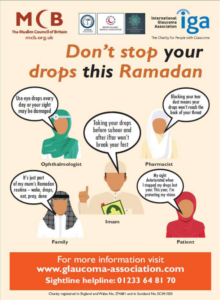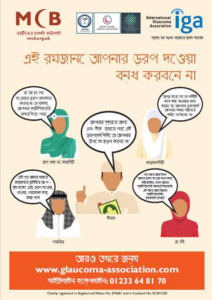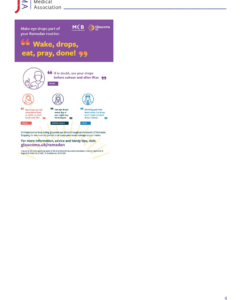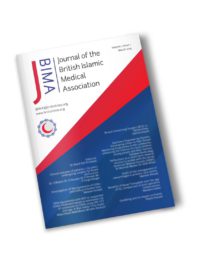
Introduction
Whilst we know about the restrictions around food and drink and oral medication during the month of Ramadan, there is still much confusion about whether eye drops are also prohibited. The importance of taking eye drops, for example, to prevent blindness from glaucoma cannot be overemphasised1. Therefore, it is of prime importance to seek to address the question of permissibility of eye drops during Ramadan from an Islamic jurisprudence perspective in order to mollify patients’ concerns, thereby helping to reduce non-compliance in a chronic progressive disorder.
Methods:
We have consulted Islamic scholars and the Muslim Council of Britain (MCB) with expertise in jurisprudence who have confirmed that, in the most widely observed Sunni and Shia legal schools, eye drops are not considered to be a cause of breaking the fast (mufti) even if traces of taste or colour reach the back of the throat. According to the traditional Haanafi and Shafi’i Sunni positions, eye drops entering the gastro-intestinal tract (jawf) via the puncti, and nasolacrimal ducts does not constitute a route of entry which will break a fast [5,6]. The traditional Twelve Shia position is that eye drops are not termed ‘food’ or ‘drink’ [7]].
However, it is also important to recognise that there are valid religious positions, albeit relatively less observed in the UK, which prohibit the use of eye drops whilst fasting. For those patients who would still be wary of using eye drops during the hours of fasting, we suggested using the morning drops at the time of the pre-dawn repast (Suhoor) and the evvening drops at the time of breaking the fast (Iftaar).
We thought that this would be an acceptable compromise to avoid non-compliance throughout the 1-month period.
Results:
Once we had confirmation from the relevant legal sources about the permissibility of eye drops whilst fasting, we undertook a wide-ranging awareness campaign delivering information to the public through various channels (table 1).
This included press releases, radio broadcasts, social media and mailshots to hospitals and opticians. Also included were monograms and patient information posters to be displayed at hospitals, opticians, mosques, and community centres (figure 1).
| Year | Press | Radio | Poster(s) | Other assets | Social media | Partners | Mailing to | ||||
| release | day | content | hospitals | ||||||||
| etc | |||||||||||
| 2018 | y | y | Y? | None | none | MCB | y | ||||
| 2019 | y | y | Y | in | Fasting calendar with | minimal | MCB, | MDA, | y | ||
| multiple | HAREF, | info | BIMA | ||||||||
| languages | postcards | (similar to | |||||||||
| poster) | |||||||||||
| 2020 | y | y | Y in Englishh | Fasting calendar with | Film | and | MCB, | MDA, | n | ||
| HAREF, film | other posts | Sppecsavers | |||||||||
| 2021 | y | y | Re-used | HAREF calendar, film | Similar | Sppecsavers, | n | ||||
| from | preev | recycled | from prev | toprevious | MCB | ||||||
| year | year, | digital | year | ||||||||
| glaucoma | support | ||||||||||
| group in Urdu | |||||||||||
| 2022 | y | y | Re-used froom previous year | Optometry | n | ||||||
| tooday, | |||||||||||
| Sppecsavers | |||||||||||
| HAREF:Health equality for ethnically minoritised communities MCB: Muslim Council of Britain | MDA: Muslim Doctors Association | ||||||||||
Table 1 summarises the outlets used forr the awareness campaign. Full data were available from 2018, although the campaign was initiated in 2016.
Discussion and Conclusion
Studies surveying beliefs of Muslims have shown that between 45.5%-63.7% of Muslims believe that eye drops invalidate a fast [2,3]. This can lead to cancelled clinical visits, insufficient clinical examination, and the potential complications from non-compliance with treatment [4]. Kumar et al. have advised warning patiients of potential long-term damaging consequences of not using eye drops to improve compliance [2], however, it is important to recognise that many individuals avoidinng eye drops are motivated by what are for most, perrceived religious concerns. There is much confusion about this issue amongst Muslims as evidenced by the multitude of questions posed to scholars on on-line Q &A forums such as www.seekershub.com and www.islamqa.info. A strategy to improve eye drop compliance in Ramadan must therefore be based on a strong religious foundation.
While clinicians are not qualified to give religious advice, it is important that they are aware of pertinent religious and cultural factorrs that influence the choices that their patients make. We hope that clinicians can signpost patients to appropriate individuals or organisations of religious authority who are able to address their concerns. By cllarifying the permissibility of eye drops in fasting accoording to the most widely observed Sunni and Shi’i legal schools as well as emphasising the clinical immportance of the medication, we hope that patients can be better informed to make decisions about their treatmeent and improve compliance. A public-awareness programme to disseminate this information in areas with significant Muslim populations should involve public health, chaplaincy, and communications departments as well as engagement with imams in the local mosques and third-sector organisations.
References
- Meier-Gibbons F, Töteberg-Harms M. Influence of Cost of Care and Adherence in Glaucomma Management: An Update. J Ophthalmol. 2020;2020:5901537.
- Kumar N, Dherani M, Jivan S. Ramadan and eye-drops: perspective of Muslims in the UK. Br J Ophthalmol. 2009; 93:551-2
- Kumar N and Jivan S. Ramadan annd Eyedrops: The Muslim Perspective. Ophthalmology. 2007; 114: 2356-60
- Aadil N, Houti IE, Moussamih S. Drug intake during Ramadan. BMJ. 2004; 329:778-8
- Al-Shurunbalali HA. Maraqi al-Fallah sharh Nur al-Idah. 2016 ed. Beirut: Dar al-Basha’iir al-Islamiyyah; 2016
- Ibn-Salim K. Taqrirat al-sadidah. Al-Tab’ah 1 ed. Jeddah: Dar al Minhaj Lil-Nashr wa-al-Tawzi; 2003
- Al-Sistani SAH. Minhāj al-ṣāliḥīn. Beirut: Dar Mu’arrakh al-Arabi; 2006.
Acknowledgements
Glaucoma UK; Muslim Council of Britain
Authorship Statement : The correspondding author attests that all listed authors meet authorship criiteria and that no others meeting the criteria have been omitted.
Copyright statement: The Corresponding A uthor has the right to grant on behalf of all authors and does graant on behalf of all authors, a worldwide licence to the Publishers and its licensees in perpetuity, in all forms, formats and mediia (whether known now or created in the future), to i) publish, reproduce, distribute, display and store the Contributioon, ii) translate the Contribution into other languages, create adaptations, reprints, include within collections and create summaries, extracts and/or, abstracts of the Contribution, iii) create any other derivative work(s) based on the Contributionn, iv) to exploit all subsidiary rights in the Contribution, v) the inclusion of electronic links from the Contribution to thhird party material where-ever it may be located; and, vi) licence any third party to do any or all of the above.




